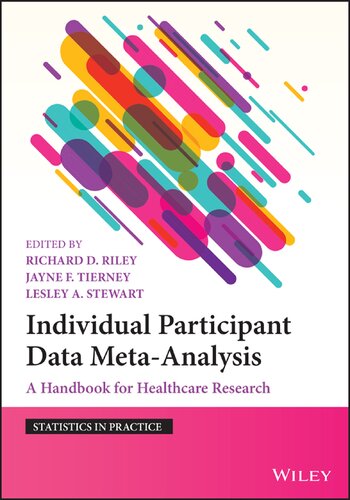Product desciption
Individual Participant Data Metaanalysis A Handbook For Healthcare Research Richard Riley Jayne Tierney Lesley Stewart by Richard Riley; Jayne Tierney; Lesley Stewart 9781119333722, 9781119333753, 9781119333760, 9781119333784, 1119333725, 111933375X, 1119333768, 1119333784, 2021000638 instant download after payment.
Individual Participant Data Meta-Analysis: A Handbook for Healthcare Research provides a comprehensive introduction to the fundamental principles and methods that healthcare researchers need when considering, conducting or using individual participant data (IPD) meta-analysis projects. Written and edited by researchers with substantial experience in the field, the book details key concepts and practical guidance for each stage of an IPD meta-analysis project, alongside illustrated examples and summary learning points.
Split into five parts, the book chapters take the reader through the journey from initiating and planning IPD projects to obtaining, checking, and meta-analysing IPD, and appraising and reporting findings. The book initially focuses on the synthesis of IPD from randomised trials to evaluate treatment effects, including the evaluation of participant-level effect modifiers (treatment-covariate interactions). Detailed extension is then made to specialist topics such as diagnostic test accuracy, prognostic factors, risk prediction models, and advanced statistical topics such as multivariate and network meta-analysis, power calculations, and missing data.
Intended for a broad audience, the book will enable the reader to:
Understand the advantages of the IPD approach and decide when it is needed over a conventional systematic review Recognise the scope, resources and challenges of IPD meta-analysis projects Appreciate the importance of a multi-disciplinary project team and close collaboration with the original study investigators Understand how to obtain, check, manage and harmonise IPD from multiple studies Examine risk of bias (quality) of IPD and minimise potential biases throughout the project Understand fundamental statistical methods for IPD meta-analysis, including two-stage and one-stage approaches (and their differences), and statistical software to implement them Clearly report and disseminate IPD meta-analyses to inform policy, practice and future research Critically appraise existing IPD meta-analysis projects Address specialist topics such as effect modification, multiple correlated outcomes, multiple treatment comparisons, non-linear relationships, test accuracy at multiple thresholds, multiple imputation, and developing and validating clinical prediction models Detailed examples and case studies are provided throughout.


